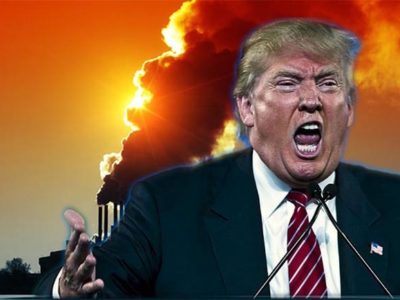Você Fala Português?
Brazil’s New Environmental Crisis Raises Crucial Constitutional and Advocacy Issues

As Dan noted last week, and as E & E News reports today, Brazil’s President-Elect, Jair Bolsonaro, is not only an authoritarian quasi-fascist (no exaggeration in those terms), but is also horrific for the environment. And that, in turn, is not simply bad for Brazil and South America, but for everyone on the planet. In recent years, Brazil has made some headway against illegal logging and destruction of the Amazon rainforest, but
Bolsonaro is against some of the policies that have helped Brazil make recent headway in combating deforestation. For example, he’s floated subsuming Brazil’s ministry of environment and the agencies that oversee conservation and law enforcement in the Amazon under the country’s agriculture ministry, which has ties to multinational agribusinesses.
He’s also taken a hostile view on preserving roadless areas. He proposed an 870-kilometer (541-mile) paved highway through protected forest, a move that critics say would invite more road construction and economic activity in the area.
This is all far from a “merely” aesthetic concern:
Often called the lungs of the planet, the Amazon is estimated to sequester upward of 2 billion metric tons of carbon dioxide each year.
That’s threatened by illegal logging. Brazil’s government estimates that 27,772 square kilometers of rainforest was illegally cleared in 2004. Government policies and local activism drove that number down to 4,571 square kilometers in 2012. Last year, illegal logging cleared 7,000 square kilometers.
I have no particular expertise on Brazil: I only came up with the headline of this post, which means “Do you speak Portuguese?” in, well, Portuguese, by googling the phrase. But there are some big questions that need to be answered in order to assess, combat, and hopefully mitigate potential damage.
- Like most Latin American countries, Brazil has a Presidential system because it copied the United States. But unlike here Donald Trump, President Bolsonaro will not have a majority in the Brazilian Chamber of Deputies, which runs on proportional representation. Bolsonaro’s Social Liberal Party, while it made huge gains in the congressional elections, is not the largest party; that role is still played by the more progressive Workers Party. The SLP has 52 seats and the Chamber of Deputies has 513 seats; in the Senate, it has only 4 seats out of 81. So: what exactly can Bolsonaro get through the Chamber and the Senate? We should not assume that small numbers will mean he cannot get things through; most reports indicate that the Congress is pretty conservative. But that isn’t the same as saying that he can do whatever he wants. In other words, before panicking, we should know more about what is the Brazilian President’s authority and what Congress can do to stop him.
- Although its level of independence is not high by world standards, in recent years, Brazil’s judiciary has been feeling its oats: activist judges essentially were the ones who brought down two of Brazil’s previous Presidents, Luiz Inacio Lula de Silva and his successor Dilma Rousseff, on corruption charges. To the extent that judges are in an oppositional mood, is there a way to turn that to environmental protection?
- Bolsonaro has made no secret of his contempt for environmental activists and indeed opposition of all kinds: he has spoken positively of Brazil’s infamous dictatorship, which lasted from 1964 to 1985. He specifically has targeted international environmental groups. But Brazil also has a vigorous civil society and well-organized groups ready to challenge him at every step. Some of those groups are environmental advocates. What form of aid and assistance can American environmental groups provide to advocates and civil society groups on the ground to resist the new regime?
I realize that this might sound Pollyannish in the wake of a disastrous election. And as I said, I have little to no background in Brazilian politics and history. But it seems to me that American advocates should start planning to link up with civil society groups in Brazil and see how we can assist and provide resources. If Bolsonaro represents part of the Trumpist Fascist International, democratic forces need to work internationally as well.
Reader Comments
2 Replies to “Você Fala Português?”
Comments are closed.






Jonathan,
Thanks for this post. Eu falo português. A few responses to your questions, or at least the first two:
1. Presidential authority in Brazil is generally stronger than in the United States. The President has a broader set of powers that can be exercised via decree and provisional measures than what POTUS can do with Executive Orders. My sense is also that the President in Brazil also has quite a bit more discretion about how to organize and re-organize various ministries; it’s done relatively frequently. The ‘ruralist’ bloc in Congress, in recent years, has been a strong impediment to environmental progress, but ultimately, in Brazil, the laws on the books are strong; it’s the loose connection to compliance and enforcement that remains the problem. The greater danger with Bolsonaro is not that he has such strong congressional support to undo environmental legislation. Rather, it’s the danger that he will decide to operate extra-constitutionally if he finds that Congress is less than pliant.
2. With the judiciary, it’s all significantly more complicated than this. Judges put Lula in jail, but only several years after he left office. It was Congress that ousted Dilma Rousseff, not because she herself was too corrupt, but rather because she was permitting the anti-corruption investigations to go forward (threatening many, many members of Congress of multiple parties). Some judges had already been clashing with the Lula and Dilma administrations on environmental issues, particularly with regard to the Belo Monte dam, which bounced up and down several times between a circuit court-level judge who repeatedly found violations of federal law and ILO Convention 169 and the Supreme Court, which repeatedly re-instated authorization for the project. There’s a pending constitutional case before the Supreme Court, involving the 2012 Forest Code amendments, as to whether the Constitution prohibits ‘regression’ in environmental laws. But, again, that’s a conflict between the judiciary and Congress, and the greater danger here is not that Congress will enact less protective laws, but rather how the new President will respond to adverse decisions.
Brazil’s Constitution is only 30 years old. It’s an anniversary that should be (and has been) commemorated this year. In particular, the 1988 Constitution’s environmental innovations should be lauded. But the prospect of constitutional crisis over the next couple of years is very, very high.
Thanks for this, Nick; I was hoping you would see it. A lot to be written about this by people like you who actually know something about the country.
If Bolsonaro moves extra-constitutionally, then we are back to trying to determine what the military will do.